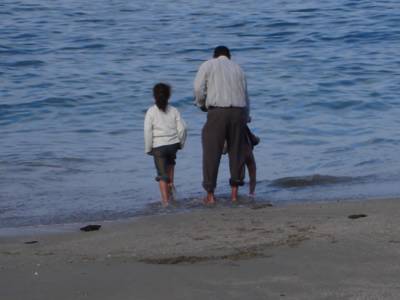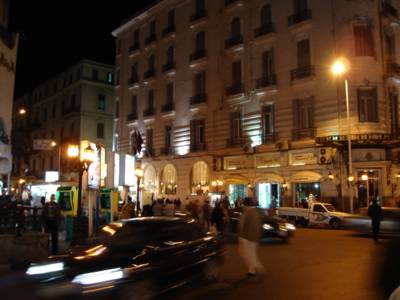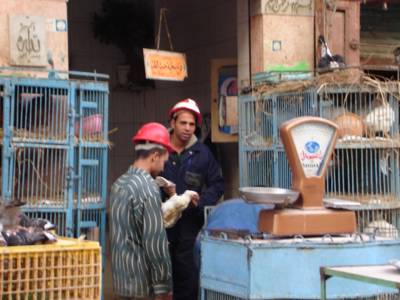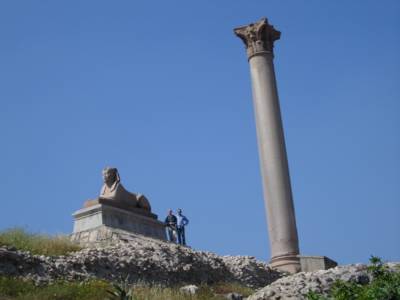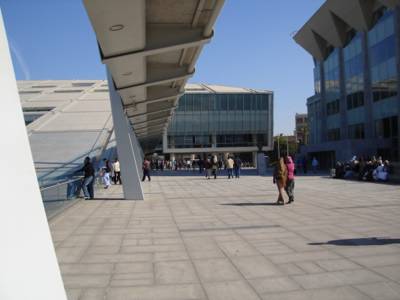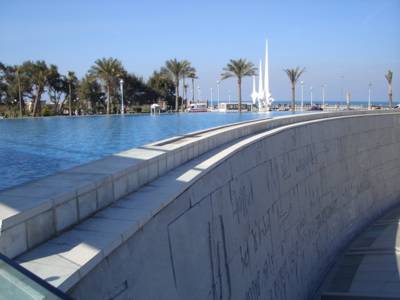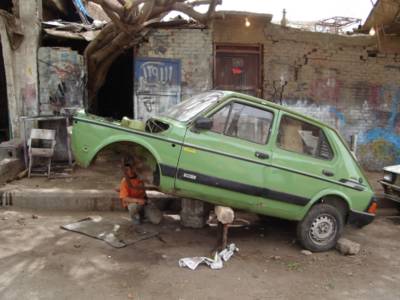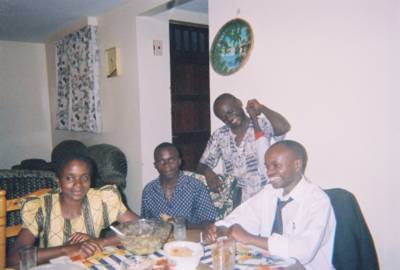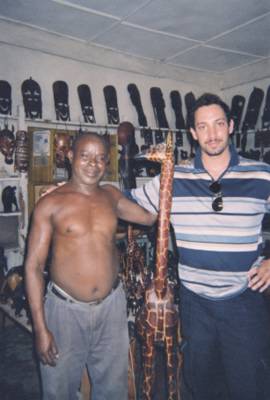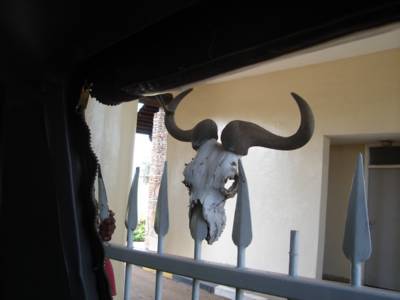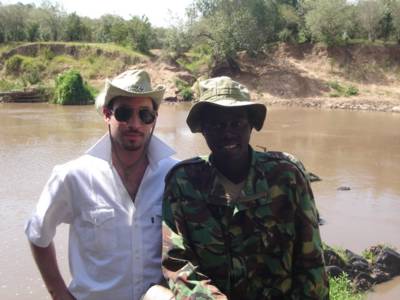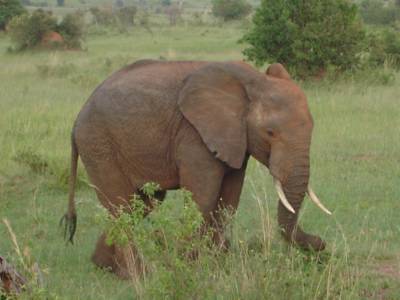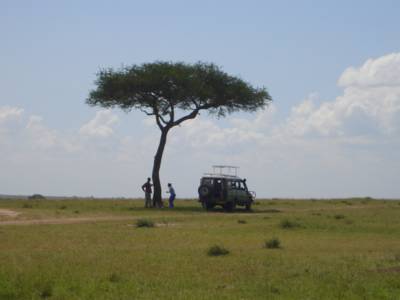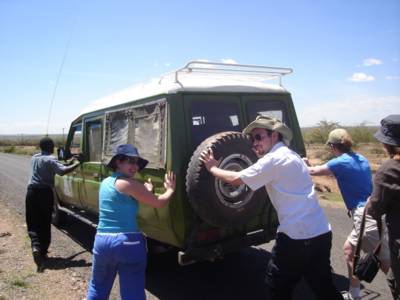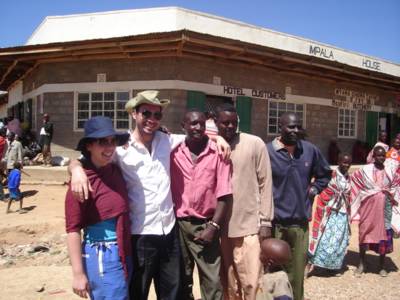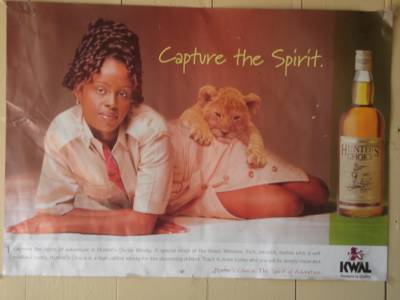Friday, March 18, 2005
weekend in alexandria
The outlook wasn't brilliant as we hopped into a taxi at 10:50a.m. to catch our 11:00a.m. train. In my best broken Arabic I told the driver to step on it, and I'll be damned if we didn't hit 100 kph on residential roads. He dropped us at the gate, I shoved double fare into his hand, and we raced to find our train waiting patiently for us at the track. We slowed to catch our breath and board, but just then the train started to pull away. We screamed and the conductor yelled and signaled for us to jump. I jumped first, Autumn next, and then Gavin threw his bags on and leaped after them as the train sped away. We made it.
Three hours and several teas later we detrained in Alexandria. After traveling from Cairo, the first thing you notice in Alexandria is the clean air. The wind blows off the Mediterranean Sea and smog hides nothing. We taxied to the old Hotel Metropole in the center of town and promenaded along the Corniche.
Highlights:
1. ancient roman theater
2. pompeii's pillar
3. screaming children begging autumn for an autograph and gavin for a picture
4. fried prawn at Fish Market restaurant
5. horse ride on the corniche
6. library at alexandria
7. ukrainian girls song and dance duo with electric keyboard in the hotel diningroom.
We left loads of time to reach the train on the way home, arriving hours early and eating a leisurely dinner outside the station. Unfortunately, it turned out to be too leisurely as we watched our train pull away, leaving us on the platform. But a wily taxi driver shoved us into his car and raced the train to the next station. If the first taxi ride was a rush, this ride was just plain scary. We were like a bowling ball speeding down the lane and knocking out pins. But instead of pins it was people, and they were scattering. At least 4 times I thought we'd kill a pedestrian. We hit the station fifteen minutes later - the driver slammed on the brakes - bolted out of the car - ran to the platform with us trailing behind. As we reached the platform the train was again moving out, but this time we were able to jump on and take our seats. Strangest thing about the whole scene was how nonchalantly the Egyptians acted, as if this happened every day. I guess it does, and now that I'm thinking it over, I'm remembering that busses in Cairo don't stop, they just slow down.
Enjoy the photos below.
Friday, March 11, 2005
kenya, part two
My last day in Kenya proved the most interesting. Before my visit, Marianne befriended a pair of Kenyan brothers, received no less than a dozen marriage proposals from their closest kin, and arranged for us to dine with them at Carnivore, a famous game eatery in Nairobi that boasts the only legal lion meat in the city. We met John David (one brother) at the old Stanley Hotel in downtown Nairobi, where Sylvester served imported beer and carefully measured one ounce glasses of scotch. Peter Hanningtone (second brother) and his wife picked us up and we headed to Carnivore. At dinner we feasted on ostrich, camel, lamb, beef, and crocodile (no lion that evening). Peter explained how a Kenyan man's great responsibility is to satisfy his wife morning, noon, and night, lest she shack up with the next door neighbor. His his wife asked me if I believed in god and told me that I looked like Jesus (I guess she doesn’t see too many white guys with goatees around Nairobi. In Cairo I fit in until I speak, but not in Kenya).
70% of Kenyans live in villages. The villages are isolated, rural, and villagers rely on farming for livelihood. Two streams run near his family's village, one for bathing, one for drinking. Peter’s village lies 5-10 kilometers away from the nearest general store, and about a 12 hour car ride from his permanent home in Nairobi. Peter drives his family to the village four times a year in their car, but most villagers take buses to Nairobi, as very few own automobiles. Peter stays for two weeks at a time with his wife and daughter. Now married, he’s built a 3 room house for himself (two bedrooms, one sitting room), and uses a kitchen located nearby. Peter and his brother grew up with their father in Nairobi while their mother stayed in the village, tending to the crops. Now that his eldest children have grown and house their younger brothers and sisters (there are about 7), Peter’s father has returned home.
The village may be far from town, but Peter explained that the villagers keep up on world events. They listen regularly to BBC and Voice of America on shortwave radio. When Peter returns for his quarterly visits, everyone asks about "the fighter" (literally the boxer) George W. Bush. Rather than asking about Bush the American President, they ask how the fighter who challenges Saddam Hussein is faring. They probably know that Bush is President of the United States, but they know him better for his struggle against Saddam. The presidency, and the United States, are mentioned rarely, if mentioned at all.
As Peter drove us to the aiport in the morning, a boy in his late teens approached the car with a stack of newspapers and handed Peter two issues. Rather than pay him cash, Peter handed him a bank receipt, and informed him that yesterday he deposited a weekly sum into his bank account. As we drove away, Peter explained that he set up the bank account to instill in the young man fiscal responsibility and knowledge.
Tuesday, March 08, 2005
After a short hiatus, the daily rod is back with a report. Since last posting I've swung through Kenya, dashed about Rome, floated up the Nile, and trained it to Alexandria. Hosni Mubarak granted a bouquet of democracy to the people of Egypt, Syria may pull out of Lebanon, Iraq is a flowering democracy, and I'm celebrating by accepting a job in our department of war.
In January I traveled and in February I entertained. I stopped first in Nairobi, Kenya, where I breathed clean air for the first time since Eastern Europe. But this air was real clean - Africa clean - if that exists (it should). My friend Marianne picked me up at the airport, and that week we visited the Masai Mara Natural Reserve, spotting 4 of the Big 5 (Lions, Leopard, Buffalo, Elephants), missing out on the Rhinos. But the Kenyan great plains compensated us with beautiful scenery and cheetah sightings galore. During the high season one sees millions of animals while they migrate across the continent, but one sees hundreds of vans stuck in a line, and from what I hear, it feels like you see more people than animals. We went during the low season, and at times, had the place all to ourselves. From the northern planes we flew south to Mombasa and took a two hour bus ride to the small resort town of Watamu. After 2 nights of a tent and no shower, the hotel looked very nice. We laid out on the white beaches where Hemingway went deep sea fishing, and tried our tongues at Italian (well, I can't speak a word, but Marianne proved proficient). The highlight was my dad's birthday gift - nothing less than a 5 foot wooden giraffe, crafted by a 4 and a half foot tall Watamu native, who must have used a step-stool to finish the piece, whittled from a solid log of wood. The craftsman assured us that he'd wrap it up nicely for us (it had to get back to New York, I explained), which meant newspaper and paper bags. The two-hour bus ride into Watamu changed into a two-hour shared van ride which looked just like the pictures you may have seen - a 14 person van filled with 25 sweaty Kenyans and two sweaty, tired, nervous Americans (my Short Hills nose proved fragile, I can assure you). Nervous because our flight left in three hours and we had zero time to get there. But we arrived and a taxi sped us to the airport, where we actually had time for a beer and a proper wrapping of the wooden giraffe (apparently that's what they do best at the Mombasa airport).
More later, enjoy the pictures.
